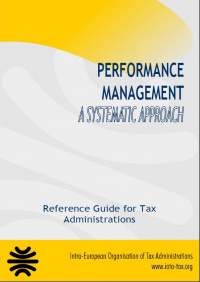Performance Management
Performance improvement has always been and will continue to be an important topic for the Tax Administrations. Like most organisations, nowadays Tax Administrations are required to become more effective and efficient, execute better business strategy, do more with fewer staff and implement innovative solutions that ensure realresults and improved performance.
There are a variety of approaches to effective performance management, and many organizations have been continuously focusing on the development of competencies and behavioural performance measures. Today’s performance management practice is “results-oriented” performance management that uses cascading goals to align individual employee’s day-to-day efforts with organizational goals and strategies.
In their attempts to implement effective performance management systems, organisations have quickly realized that there are significant challenges associated with performance management, such as how to effectively define specific goals where some tasks are very fluid and ever changing or have rote performance requirements; how to ensure fairness when some managers set very hard target goals and others easy target goals, especially when goal accomplishment is linked to staff salary; and how to put achievements of goals on a scale so that employees who deliver different types of results could be systematically and fairly evaluated and properly rewarded.
This is the reason why IOTA, in the Area Group Human Resources Management, decided to create a Task Team in order to provide a reference guide to all members who want to further develop their approach to Performance Management.
The Guide offers a logical and concrete step by step process with important considerations and decisions at each step. The main purpose of this publication is to guide Tax Administrations in designing or reengineering, and just as importantly, implementing their performance management systems. The guide presents a down-toearth, pragmatic approach that focuses on what Tax Administrations can do to gain the best value from performance management and make their processes work effectively.
The performance improvement practices are the result of ongoing efforts, and therefore the Guide provides insights into where Tax Administrations are today with performance management; what are the main factors driving their attempt to improve activities and increase productivity; how do they learn from their own and others’ experience; what added value does a system of performance management bring to the different stakeholders of tax administration; and how the performance management system could be evaluated. Particular emphasis is given to both strategic and tactical issues, with inspiring examples and experiences to guide every step along the way.
Practical advice and examples of IOTA members are provided throughout the Guide, translating their experiences, ideas, concepts and considerations into concrete and practical development and implementation steps that managers and human resources professionals can apply in their own work situations.
Hopefully, this guide will be relevant and useful to anyone apparently interested in designing and implementing or already involved in performance management system – executives, managers, and human resources professionals in IOTA member tax administrations.
We would like to thank all the participants who took part in completing the questionnaire, both for the time they gave to collect valuable information and for the openness with which they shared their performance management practice. We would also like to thank the Task Team, in particular, Mr. Torsten Burman from Sweden, Ms. Alix Perrignon de Troyes from France, Mr. Tibor Kovács from Hungary, Ms. Cinzia Castelli from Italy and Mr. José Ramón Crespo Sánchez from Spain, for their help, input and advice throughout the preparation of this Guide.
